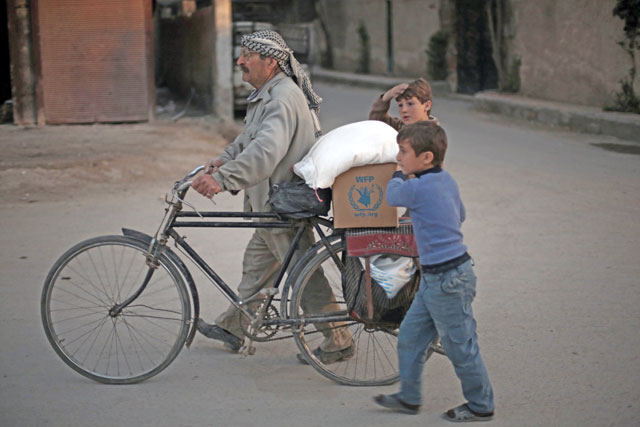BEIRUT —The Syrian opposition cast doubt on Wednesday on whether UN-backed peace talks would go ahead on March 9 as planned, as rebels said they were under fierce government attack near the Turkish border despite a cessation of hostilities agreement.
The agreement drawn up by the United States and Russia came into effect on Saturday and has slowed but not entirely stopped the conflict approaching its sixth anniversary. Both the government and rebels have accused each other of violations.
The agreement does not include Daesh or Al Nusra Front, which is widely deployed in opposition areas.
The United Nations said on Tuesday a new attempt at peace talks would begin on March 9 in Geneva, urging warring sides to ensure the cessation agreement take hold to allow them to come to the table.
But opposition official George Sabra said the dates for a resumption of talks remained "hypothetical" as long as the current truce did not fulfil humanitarian demands including a release of detainees held by the government.
"As long as the truce does not help implement the terms (of a United Nations resolution), all dates for the resumption of negotiations remain hypothetical," Sabra told Arabic news channel Arabiya Al Hadath on Wednesday.
The opposition is pressing for full humanitarian access to rebel-held areas and for detainees to be released — terms set out in a UN Security Council resolution passed in December.
Opposition officials say an increase in aid access has fallen short of what is required.
"What is the value of a truce if its overseers — meaning America and Russia — do not push all sides to abide by it?" Sabra said. "The stability and success of implementing the truce's goals will be the main factor for the resumption of negotiations on the date announced by [UN Syria envoy Staffan]de Mistura," Sabra said.
The White House said it had seen a reduction in air strikes against the opposition and civilians in Syria in recent days but was concerned by some reported tank and artillery attacks.
A senior US official said Washington was working with Moscow to improve access to besieged areas.
The World Health Organisation said it had delivered medical supplies to the besieged town of Mouadamiya on Wednesday, after reporting some medicines had been removed from a previous aid delivery. There was no immediate comment from Damascus.
Challenging
President Bashar Assad said in an interview broadcast on Tuesday that insurgents had breached the deal from day one, and the Syrian army was refraining from responding to give a chance for the agreement to last, warning that there “are limits”.
Five months of Russian air strikes have turned the momentum Assad’s way in the war that has killed more than 250,000 people and created refugee crises in neighbouring states and Europe.
Antony Blinken, deputy US Secretary of State, said in Geneva that major and regional powers were monitoring the cessation of hostilities to “prevent any escalation” but it was a “challenging process”.
“The best possible thing that could happen is for the cessation of hostilities to really take root, and to be sustained, for the humanitarian assistance to flow and then for the negotiations to start,” he said.
While residents of some parts of Syria are describing an unusually calm spell, rebels say government forces backed by Russian air strikes have continued offensives in areas of strategic importance in northwestern Syria.
The Syrian government is saying very little about military operations in those areas, where Al Nusra Front is widely deployed in close proximity to groups fighting under the banner of the Free Syrian Army that have accepted the agreement.
A rebel official and the Britain-based Syrian Observatory for Human Rights monitoring group said government forces pressed an offensive against insurgents in Latakia province at the Turkish border on Wednesday.
Fadi Ahmad, spokesman for the First Coastal Division, an FSA group, said government forces had brought in reinforcements for the battle and that fighting was as intense as anything preceding the cessation of hostilities.
“The battles were today very fierce,” he said.
The Syrian government, backed on the ground by Iranian forces and Lebanon’s Hezbollah, has prioritised securing the Turkish border through which rebel groups are supplied with weapons from states seeking Assad’s downfall.
The area being fought over in Latakia overlooks the rebel-held town of Jisr Al Shughour in neighbouring Idlib province, and the Ghab Plain, where rebel advances last year were seen as a growing threat to Assad.
A rebel commander in northern Syria said: “Battles continue in vital areas that the regime wants, and where there was no truce in the first place. There is bombardment and battles.”
“We are in the fifth day and there is no change in these areas,” he said, in reference to areas in the provinces of Latakia, Homs and Hama.
Fighting also flared anew in Aleppo between insurgents and an alliance including the Kurdish YPG militia, the Observatory said.
A report by the Institute for the Study of War showed Russian strikes in support of government forces and their allies had hit a number of areas in Aleppo, Idlib, Homs and Hama provinces since the truce deal took effect.
While battling Syrian insurgent groups in Aleppo province, the YPG is also fighting Daesh with the help of a US-led alliance further east. The group said on Wednesday that 43 of its fighters were killed in a Daesh attack on two towns near the Turkish border at the weekend.
